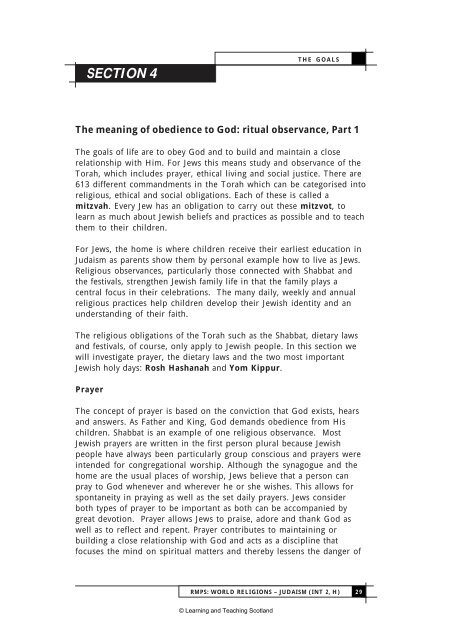RMPS - Int2/Higher - World Religions - Judaism - Education Scotland
RMPS - Int2/Higher - World Religions - Judaism - Education Scotland
RMPS - Int2/Higher - World Religions - Judaism - Education Scotland
Create successful ePaper yourself
Turn your PDF publications into a flip-book with our unique Google optimized e-Paper software.
SECTION 4<br />
THE GOALS<br />
The meaning of obedience to God: ritual observance, Part 1<br />
The goals of life are to obey God and to build and maintain a close<br />
relationship with Him. For Jews this means study and observance of the<br />
Torah, which includes prayer, ethical living and social justice. There are<br />
613 different commandments in the Torah which can be categorised into<br />
religious, ethical and social obligations. Each of these is called a<br />
mitzvah. Every Jew has an obligation to carry out these mitzvot, to<br />
learn as much about Jewish beliefs and practices as possible and to teach<br />
them to their children.<br />
For Jews, the home is where children receive their earliest education in<br />
<strong>Judaism</strong> as parents show them by personal example how to live as Jews.<br />
Religious observances, particularly those connected with Shabbat and<br />
the festivals, strengthen Jewish family life in that the family plays a<br />
central focus in their celebrations. The many daily, weekly and annual<br />
religious practices help children develop their Jewish identity and an<br />
understanding of their faith.<br />
The religious obligations of the Torah such as the Shabbat, dietary laws<br />
and festivals, of course, only apply to Jewish people. In this section we<br />
will investigate prayer, the dietary laws and the two most important<br />
Jewish holy days: Rosh Hashanah and Yom Kippur.<br />
Prayer<br />
The concept of prayer is based on the conviction that God exists, hears<br />
and answers. As Father and King, God demands obedience from His<br />
children. Shabbat is an example of one religious observance. Most<br />
Jewish prayers are written in the first person plural because Jewish<br />
people have always been particularly group conscious and prayers were<br />
intended for congregational worship. Although the synagogue and the<br />
home are the usual places of worship, Jews believe that a person can<br />
pray to God whenever and wherever he or she wishes. This allows for<br />
spontaneity in praying as well as the set daily prayers. Jews consider<br />
both types of prayer to be important as both can be accompanied by<br />
great devotion. Prayer allows Jews to praise, adore and thank God as<br />
well as to reflect and repent. Prayer contributes to maintaining or<br />
building a close relationship with God and acts as a discipline that<br />
focuses the mind on spiritual matters and thereby lessens the danger of<br />
<strong>RMPS</strong>: WORLD RELIGIONS – JUDAISM (INT 2, H) 29<br />
© Learning and Teaching <strong>Scotland</strong>
















